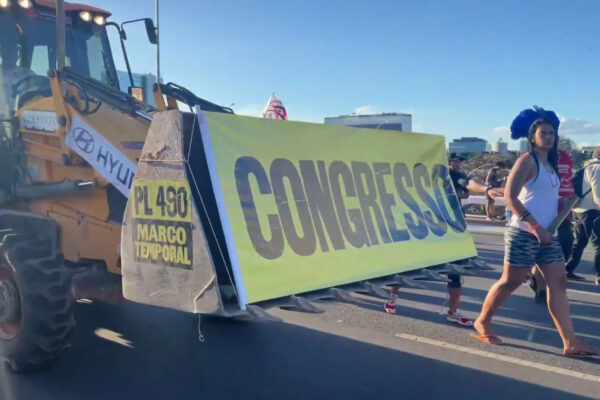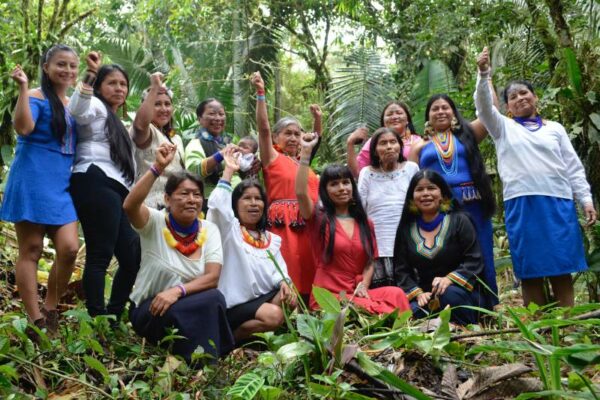San Francisco – The Peruvian government’s announcement that it is revising three rainforest oil concessions to exclude official reserves intended to protect some of the last native Amazonian populations still living in isolation received a warm welcome from indigenous and environmental organizations today. The government has also committed to review four other concessions.
Meanwhile, Peru’s human rights ombudsman (Defensoría del Pueblo) has publicly launched an independent investigation of all 11 new Amazonian oil concessions being auctioned by Perupetro, the state-owned oil company, to ascertain whether they infringe the rights of indigenous communities and violate Peruvian laws.
Both measures follow heavy pressure from Peruvian indigenous leaders as well as Peruvian and US environmental and human rights groups, who attended a presentation to US investors in Houston last week by Perupetro, Peru’s state-owned oil company. On Friday, indigenous leaders took to the stage at the presentation at Houston’s Petroleum Club and told approximately 200 representatives of oil majors, including Exxon Mobil, that their communities would vigorously oppose both the auction and exploitation of any drilling blocks intruding on their tropical rainforest homelands.
AIDESEP, an umbrella organization representing indigenous peoples from the Peruvian Amazon, has repeatedly warned that contact with outsiders could cause epidemics as well as psychological trauma and socio-cultural dislocation for the vulnerable populations. The organization greeted the government’s announcement positively but warned that another four concessions still intrude on proposed reserves for indigenous groups living in isolation.
In a statement, AIDESEP demanded “the immediate exclusion of all seven oil concessions that overlap Territorial Reserves for isolated indigenous peoples, meaning both the ones that are officially recognized and those that are proposed given these represent an attack against the life and health of these extremely vulnerable populations.”
The three concessions that will be redrawn are Blocks 132 and 138, both in the central Ucayali region of Peru’s vast tropical rainforest territories, and Block 133 in the southern Madre de Dios region. Those three concessions intrude on the State Reserves of Murunahua, Isconahua and Madre de Dios respectively. The reserves were set up precisely to protect the isolated indigenous populations that live there and to prevent any contact initiated by outsiders, something that is banned under Peruvian and international law.
“I don’t believe this will generate major problems for the investors interested in exploring these blocks as they are small areas and, in addition, these are regulations used at the international level,” Juan Valdivia, the Minister of Energy and Mines was quoted as saying by Andina, the Peruvian government’s news service, following a meeting with AIDESEP yesterday.
Separately, the Peruvian government will allow a commission, from INDEPA, a government agency established to promote the culturally-appropriate development of indigenous Peruvians and Afro-Peruvians, 30 days to present a report on whether isolated native communities live in areas covered by four other concessions, 135, 136 and 137 in the province of Loreto, and 139 in Ucayali.
Lily la Torre, a leading Peruvian indigenous rights lawyer and Director of Peruvian NGO Racimos de Ungurahui, said: “This is a positive development from the Peruvian government. Nevertheless, this decision simply demonstrates respect for human rights, legal norms and the constitution of our country, which all Peruvians and investors should already expect the government to uphold.”
In total, Perupetro is tendering 11 Amazonian blocks, covering approximately 22 million acres of highly biodiverse, intact primary tropical rainforest. In addition to the three blocks which intrude upon the reserves for indigenous peoples in isolation, three overlap protected areas and nine intrude upon titled indigenous lands. Only one block does not intrude on either indigenous lands or protected areas.
In none of the blocks has Perupetro obtained Free, Prior and Informed Consent (FPIC), an internationally-recognized human rights benchmark intended to protect the rights of indigenous communities whose lives and lands stand to be affected by extractive mega-projects such as oil drilling.
The new blocks would mean that approximately 70 percent of the Peruvian Amazon, one of the largest areas of tropical rainforest anywhere in the world, will be carved into oil concessions. As recently as 2005, before the U.S. Government’s Trade Development Agency gave Perupetro U.S. tax dollars to develop and market its oil concessions, it was under 20 percent.
Huge areas of Peru’s rainforest, such as the Lower Urubamba region in the south and the Corrientes River in the north, and the indigenous communities that live there have already suffered severe impacts as a result of drilling for oil and gas.
Perupetro’s bidding round comes as investors grow increasingly concerned about the high risks of hydrocarbon activities in remote areas of the Amazon. Some oil majors are already giving up because of the huge logistical challenges and the often intense opposition of local communities increasingly aware of the ecological and public health crises caused by oil drilling in other parts of the Amazon.
For background on the struggle of indigenous peoples in the Amazon, visit www.amazonwatch.org
# # #













